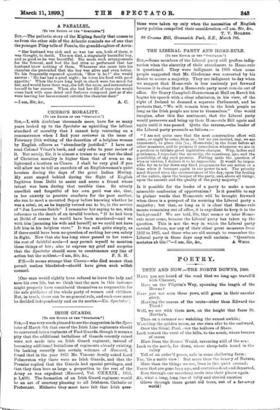THE LIBERAL PARTY AND HOME-RULE.
[To TRT EDITOT OP THY "SPTCTAT0R.1
SIR,—Some members of the Liberal party still profess indig- nation when the sincerity of their attachment to Home-rule is questioned. They were indignant in 1885 when some people suggested that Mr. Gladstone was converted by his desire to secure a majority. They are indignant to-day when we suggest that Home-rule is less zealously pat forward because it is clear that a Home-rule party must remain out of office. Sir Henry Campbell-Bannerman at Hull on March 8th begins his speech with a clear admission, in his view, of the right of Ireland to demand a separate Parliament, and he
protests that, "We will remain true to the Irish people as long as the Irish people are true to themselves." One would
imagine, after this fine sentiment, that the Liberal party would persevere and bring up their Home-rule Bill again and again until it was passed. Quite the reverse,—the leader of the Liberal party proceeds as follows :—
" I am not quite sure that the next constructive effort will come, or ought to come, from us ; but we are invited, nay, we are summoned, to place this [i.e., Home-rule] in the front before all other measures, and to promise it precedence whenever we are in a position to initiate great legislative changes. Why, ladies and gentlemen, I repudiate the necessity, the expediency, aye, and the possibility, of any such promise. Putting aside the question of wise or unwise, I declare it to be impossible. It would be impos- sible for us to lay down any fixed programme for our action at a time when it becomes again in our power to act. The priority must depend upon the circumstances of the day, upon the feeling of the nation, upon the temper of the party, and, above all things, upon the amount and the quality of the party majority."
Is it possible for the leader of a party to make a more miserable confession of opportunism ? Is it possible to say in plainer words that Home-rule will be brought forward when there is a prospect of its securing the Liberal party a majority ; but that, as long as it is clear that Home-rale means remaining out of office, it is expedient to keep it in the background ? We are told, Sir, that sooner or later Home- rule must come, because the Liberal party has taken up the question. This is not the way in which the Liberal party carried Reform, nor any of their other great measures from 1832 to 1885, and those who are old enough to remember the Liberal party in those days may well exclaim : "Quantum mutatus ab illo I "—I am, Sir, &o., A WHIG.






































 Previous page
Previous page